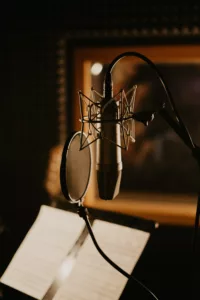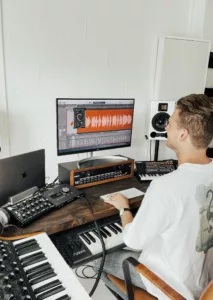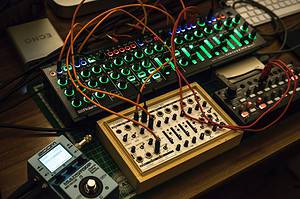Giving Musicians the Tools to Make Better Music
Digital vs. Analog Mixers: Pros, Cons, and Performance

Hey there, audionauts and sound-scapers! Mattie here. Welcome to another episode of “Unraveling the Mysteries of the Sound Universe,” or as we fondly call it—UMSU. Okay, I just made that acronym up, but hey, it’s got a catchy ring, doesn’t it?
Today, we’re diving into the Beatles vs. Stones of the audio world: Analog vs. Digital Mixers. Ah yes, the age-old debate that has sound engineers, podcasters, and bedroom musicians getting their XLR cables in a twist. You’ve seen the forums, the Reddit threads, and those opinionated Twitter rants—everyone has a hot take on this. But what’s the real deal? What are the differences? And should you care?
By the end of this melodious monologue, you’ll be equipped with enough info to pick your side. Whether you’re about to produce the next chart-topping hit or simply lay down some sick beats for your grandma’s 80th birthday bash, this guide will help you make an informed choice. Oh, and just so we’re clear, your choice of mixer might not make you the next Quincy Jones, but it sure as hell can elevate your sound game.
The Big Questions We’ll Tackle:
- What’s the difference between analog and digital mixers?
- How does each affect your music’s quality?
- Is one better than the other for your specific audio needs?
We’re going to dive deep here. Just like you wouldn’t use a hammer to slice bread (unless you’re into that sort of thing), knowing what you need is crucial to finding your ideal mixer. Speaking of finding what you need, you might also want to check out our in-depth guide on Analog vs. Digital Audio Explained to complement today’s discussion.
So, buckle up. Let’s get started.

Analog Mixers 101
What is an Analog Mixer?
Before we start throwing digital daggers, let’s give analog its moment in the sun, shall we? An analog mixer is essentially the grandpa of the audio world. It’s been around, it’s got stories, and if it had cheeks, you’d want to pinch them.
An analog mixer deals with electrical signals that are, you guessed it, analogous to the original sound. It uses hardware—knobs, sliders, and switches to make real-time adjustments. When you rotate that treble knob or push the volume slider up, you’re manipulating electrical currents, baby! That’s some Tony Stark stuff right there.
Pros of Analog Mixers
High-Quality Sound
Analog mixers are famous for delivering a warm, rich sound that makes you feel like you’re wrapped in a cozy blanket made of Frank Sinatra’s vocals. It’s organic, it’s real, and it captures nuances that digital systems often smooth over. It’s like comparing your grandma’s homemade apple pie to a store-bought one. Sure, both are pies, but one has love in it—okay, and maybe a few secret ingredients.
Physical Controls
Turning knobs, pressing buttons, and sliding faders on an analog mixer is practically an ASMR experience for sound engineers. No mouse, no problem. The tactile engagement is a big part of the allure. It’s like playing a grand piano—each key you press, every note you make, is a real, physical action with immediate auditory reward.
The Joy of Twiddling
Yes, I said it—twiddling. The hands-on approach of an analog mixer feels almost like an art form. It’s this tactile intimacy that many sound engineers and musicians find endearing. Also, let’s be real; there’s something immensely satisfying about turning a knob and hearing the immediate impact on your sound.
Cons of Analog Mixers
Size and Portability
When it comes to analog mixers, size does matter. They can be quite bulky. Think of them as the grand pianos of the audio world—you’re not going to be hauling these bad boys to every gig or backyard BBQ. Also, let’s not forget the power needs and all those cable connections.
Lack of Presets
What you see is what you get. No fancy presets to save your settings. Every time you start a new session, you’re setting up from scratch. It’s like having to relearn the controls of your video game every time you play. Annoying, right?
It’s Not Cheap, Folks
High-quality analog mixers can give your wallet a run for its money. Sure, you can find budget options, but if you’re aiming for that top-notch sound quality, be prepared to part with some serious cash.
Feeling nostalgic yet? Analog mixers have their charm and their challenges. They’re a beautiful blend of tactile control and tonal richness, but they’re not for everyone. If the thought of setting up an analog system excites you as much as a guitar solo in a rock ballad, you might also want to dive deeper into the real differences between Analog and Digital Synthesizers.
So, is analog the grand symphony or a fading tune in your sound story? Think it over while we flip the record and give digital its turn on stage.
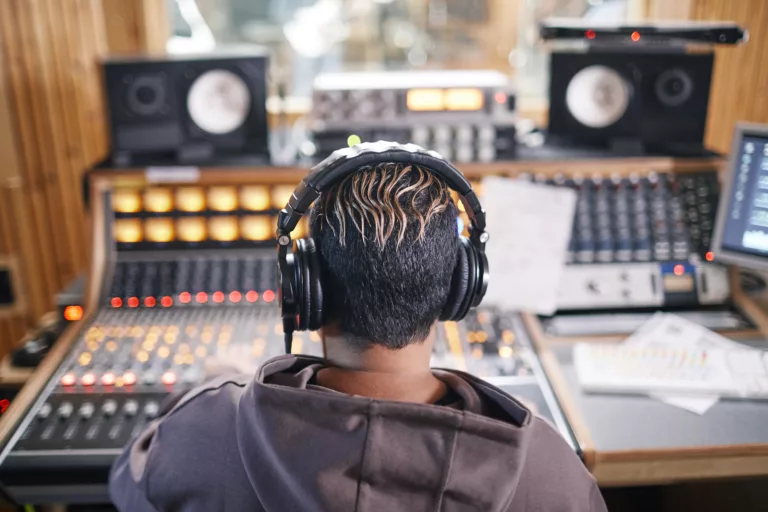
Digital Mixers: The New Kids on the Block
What is a Digital Mixer?
So, if analog mixers are the grandpas of the audio world, consider digital mixers the tech-savvy grandchildren who help you set up your Wi-Fi. A digital mixer takes your analog audio signals, converts them into digital data, and allows you to manipulate this data in near-endless ways. You’ve got digital effects, automated tasks, and a treasure trove of preset options at your fingertips.
Unlike the physical, “turn-this-knob-pull-that-fader” approach of analog mixers, digital mixers often employ touch screens and software interfaces. Imagine driving a Tesla after years of navigating the road in a vintage Volkswagen Beetle. Both will get you from point A to point B, but one comes with a lot more bells and whistles.
Pros of Digital Mixers
Convenience and Portability
Digital mixers are usually much smaller and lighter than their analog counterparts. They’re the kind of gear you can toss in your backpack and hit the road. This convenience can be a real game-changer, especially if you’re a musician or sound tech who’s always on the go.
Presets and Automation
Let’s talk presets, shall we? With a digital mixer, you can save your settings for different scenarios or even individual songs. You could practically have a preset for each verse of “Bohemian Rhapsody” if you wanted to! The automation possibilities are nearly endless, giving you the freedom to focus on other elements of your sound production.
Feature-Rich
With digital mixers, you often get additional features like built-in digital effects, equalization options, and sometimes even DAW (Digital Audio Workstation) integration. If you’re into multitasking, this is your dream machine. It’s like having a Swiss Army knife when all you used to carry was a butter knife.
Cons of Digital Mixers
The Learning Curve
Here’s the catch—digital mixers can be a bit overwhelming, especially if you’re used to the straightforward, hands-on operation of an analog mixer. With great power comes great responsibility, or in this case, a beefier manual.
Potential for Digital Distortion
While analog mixers produce warm distortions that some may find aesthetically pleasing, digital mixers are less forgiving. When they clip, it’s not a pretty sound. It’s like nails on a chalkboard, but in your music.
Cost Implications
Quality digital mixers don’t come cheap either. You might save on physical space, but don’t expect to save much in the money department unless you’re going for entry-level gear. And even then, you often get what you pay for.
So there you have it. Digital mixers are the fast cars of the audio world—sleek, modern, and full of high-tech features. But they come with their own set of challenges, too. If the world of digital mixing intrigues you, you’ll also find our guide on Analog vs Digital Recording: Which Captures Music Better? to be a fascinating read.
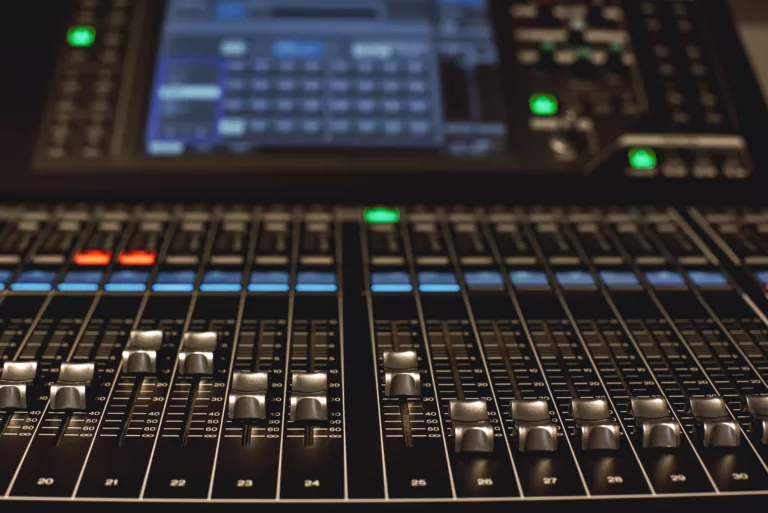
The Ultimate Showdown: Analog vs. Digital Mixers Compared
The Big Factors
So you’ve been through Analog Mixers 101 and Digital Mixers Decoded. Great! But which should you pick for your specific needs? Before you turn into an armchair audio expert—or worse, make a hasty purchase that has you wallowing in buyer’s remorse—let’s weigh the big factors.
Sound Quality
If you’re seeking that warm, full-bodied sound that makes your ears feel like they’re sipping on a cup of gourmet hot chocolate, analog is your go-to. However, digital mixers are catching up, and many high-end models can emulate the “analog sound” quite convincingly. Consider what you want your end product to sound like, not just what the mixer itself sounds like.
Let’s be real. If you want to be the audio equivalent of a Swiss Army knife, ready to tackle a multitude of sound scenarios with the flick of a preset, then digital is your savior. From built-in digital effects to advanced routing options, digital mixers offer unparalleled flexibility, especially when compared to analog mixers that are pretty much “what you see is what you get.”
Ease of Use
Analog mixers have a more hands-on, user-friendly interface—ideal for those who love the tactile experience of physically manipulating sound. Digital mixers, though packed with features, come with a steep learning curve. It’s like flying a drone when you’ve only ever flown kites—exciting but nerve-wracking.
Cost
Neither analog nor digital mixers are particularly “cheap” if you’re going for quality. The game here isn’t about what’s less expensive, but what offers more value for your specific needs. If you want a robust, feature-packed system, you may find that digital gives you more bang for your buck.
When to Choose Analog
Given the above considerations, you may find analog mixers better suited for:
- Live performances where that rich, “in the moment” sound quality is vital
- Settings where you need immediate, real-time control without diving into sub-menus
- Situations where you want to minimize the risk of technical failures
Feel like analog might be your soulmate? Be sure to read our article on Signal Quality Compared: Analog vs. Digital for a deeper dive into the nitty-gritty of sound quality.
When to Choose Digital
On the flip side, digital mixers are excellent for:
- Studio recordings where you can take advantage of presets and digital effects
- Complex audio setups that require extensive routing and multiple input/output options
- Situations where portability and space are key considerations
If you’re leaning towards Team Digital, don’t forget to check out our piece on Mixer Face-Off: Analog vs. Digital – Which Should You Choose? for more insight.
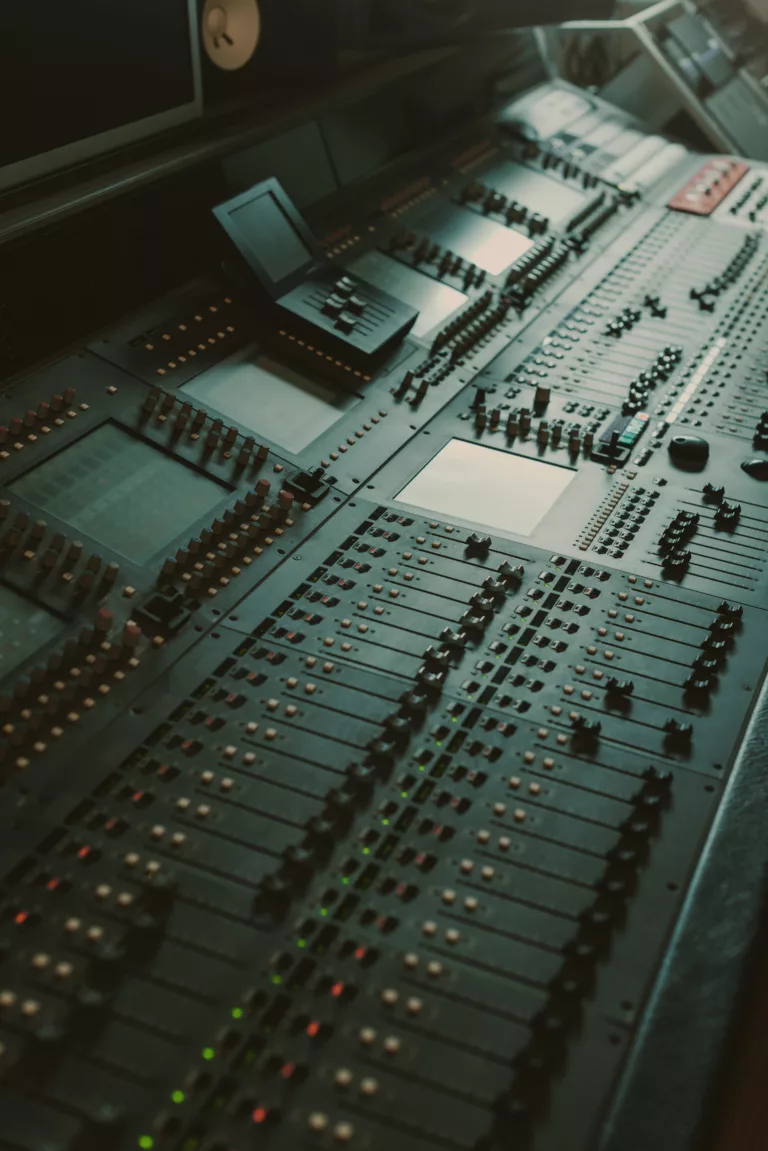
Use Cases – Which One’s for You?
Alright, let’s cut through the noise and get down to brass tacks—what should YOU be using in YOUR setup? Below, I’ll break down some common scenarios where one might opt for either analog or digital mixers.
Beginner Home Studios
So you’re dipping your toes into the realm of audio production? Great! Welcome to the party, we’ve been waiting for you. But before you go all out and buy the flashiest, most expensive gear (because, let’s face it, we’ve all been tempted), take a moment to consider your actual needs.
Recommendations and Why
Analog Mixers: If you’re just starting out and your setup is relatively simple, an analog mixer might be a solid choice. They’re generally easier to understand and operate, and you get immediate tactile feedback, which can be helpful for a beginner. It’s like learning to drive with a stick-shift; if you can handle this, you can handle anything.
Digital Mixers: Got some extra cash and a knack for tech? A low- to mid-range digital mixer might be more up your alley. You’ll get extra features like presets and effects that can really make your initial projects pop.
Either way, remember, the most important thing is that you’re learning and creating. For more guidance, head over to our piece on Analog vs Digital Synthesizers: What’s the Real Difference? for some enlightening insights.
Professional Studios
This is where the “big boys” play, and their toys? Definitely not from Toys “R” Us.
What the Big Players in the Industry Use
Analog Mixers: Believe it or not, many top-tier studios still employ high-end analog mixers for specific tasks, especially for recording live instruments and vocals. Analog mixers offer that rich, warm sound that’s become the golden standard in audio production.
Digital Mixers: On the flip side, digital mixers dominate the landscape when it comes to mixing and mastering. The automation, advanced routing capabilities, and built-in effects make digital mixers a must-have for complex projects that demand precision.
Want to play in the major leagues? Check out our article on Analog vs Digital Recording: Which Captures Music Better? for some pro-level wisdom.
Live Sound
Alright, let’s get real about live settings. Because when you’re on stage, it’s go time, and you don’t want your gear to drop the ball.
How Each Type of Mixer Holds Up in Live Settings
Analog Mixers: When it comes to live sound, analog mixers have been the go-to for years. They offer real-time control without any latency, which is crucial when you’re jamming out in front of an audience who paid to see you perform, not fiddle with a touchscreen.
Digital Mixers: Modern digital mixers have made significant strides in live sound scenarios. They come packed with features like preset scenes for different acts or songs, which can be a godsend when transitioning from the opening band to the headliner.
Still debating? Dive into the specifics with our detailed guide on Mixer Face-Off: Analog vs Digital – Which Should You Choose?
Conclusion: The Final Mixdown
Whew, that was a whirlwind tour through the labyrinthine world of mixers, wasn’t it? If you’ve stuck with me until now, give yourself a well-deserved pat on the back. Or better yet, treat yourself to some new gear—you’ve earned it!
Summary of the Major Points
- Sound Quality: Analog mixers deliver that soul-stirring warmth while digital mixers are constantly evolving to mimic their analog counterparts.
- Flexibility: Digital mixers offer a smorgasbord of features, making them the go-to for complex audio routing and effects.
- Ease of Use: Analog mixers win hands-down if you value a tactile, user-friendly interface. Digital mixers, however, demand some tech-savvy prowess.
- Cost: Both types have their budget and high-end models, but the real value lies in how well they meet your specific needs.
The Lowdown
In the realm of Beginner Home Studios, an analog mixer is often the easiest to get started with, but digital mixers offer more features for those willing to climb the learning curve. In Professional Studios, both analog and digital mixers find their places, usually co-existing peacefully like yin and yang. And when it comes to Live Sound, analog still reigns supreme for its real-time, tactile controls, although digital mixers are fast making inroads with their preset capabilities.
The Personal Touch
In the end, the “best” mixer is like your favorite guitar pick—utterly personal and irreplaceable. It’s about what feels right in your hands, what sounds right to your ears, and what works right for your unique musical endeavors.
So whether you’re making your first foray into music production or you’re a seasoned pro, the key takeaway is this: your mixer is an extension of your creative self. Choose wisely, but more importantly, have fun exploring the endless sonic possibilities it offers. For more analog vs digital throwdowns, don’t forget to check out Beating the Drum for Analog: Are Digital Drums Up to the Mark?
Alright, you sonic alchemists, that’s it for this round. Got more questions? Don’t hesitate to drop them in the comments or reach out directly. Until next time, keep those beats coming and those mixes flowing!
Happy mixing,
Mattie
Thanks for reading! If you still need help, check out my Free Vocal Presets for Logic Pro X that will get your vocals sounding amazing in no time!!
Mattie
Check Out Our Other Articles!
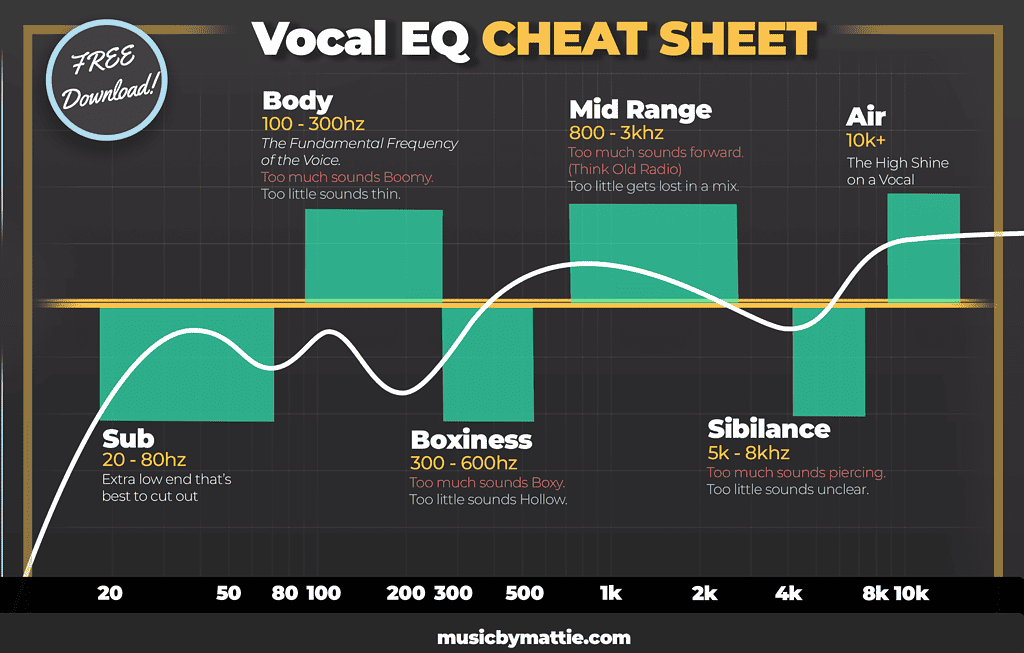
Download our FREE Vocal EQ Cheat Sheet!
Mattie
Post Info
Join "5 Beat Friday"
Every week you'll get 5 beats about the production world. Join the over 5,000+ other producers bettering themselves through 5 Beat Friday!

